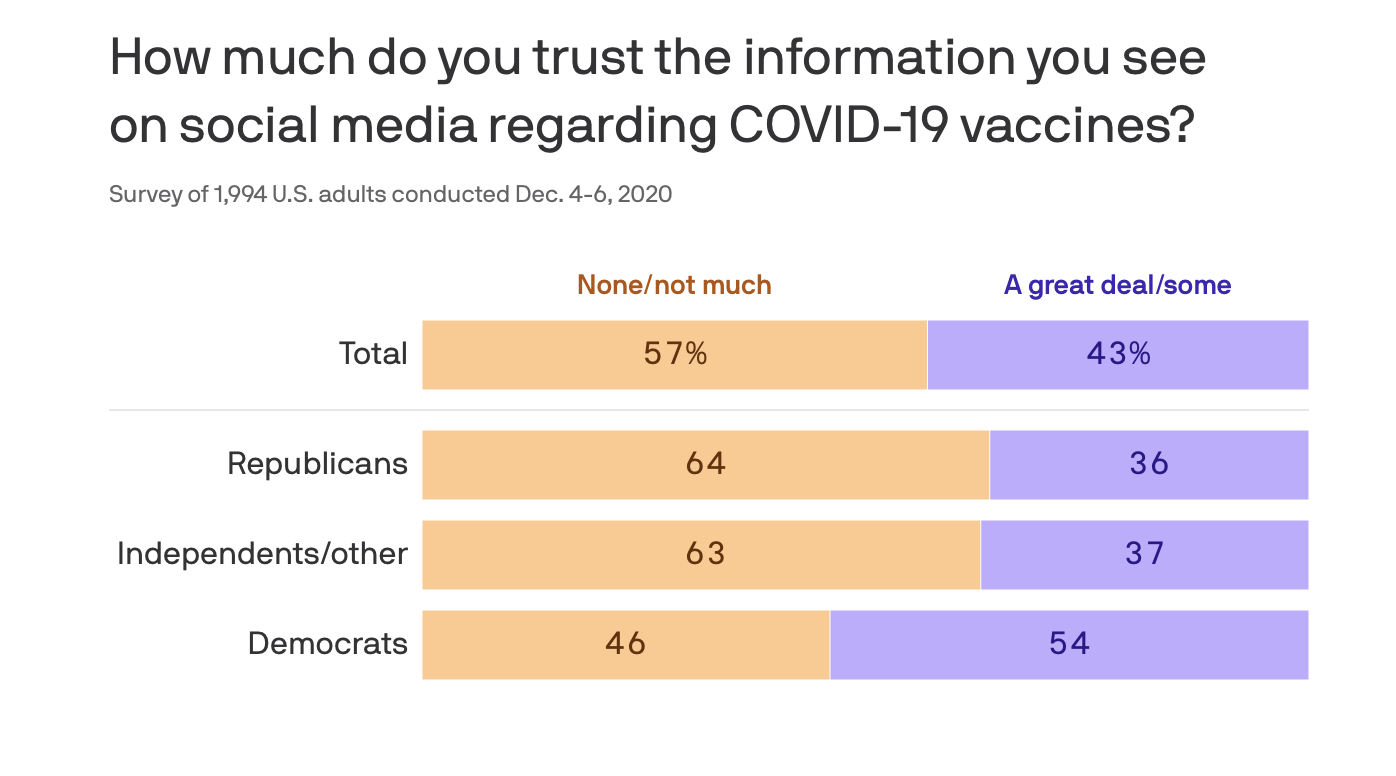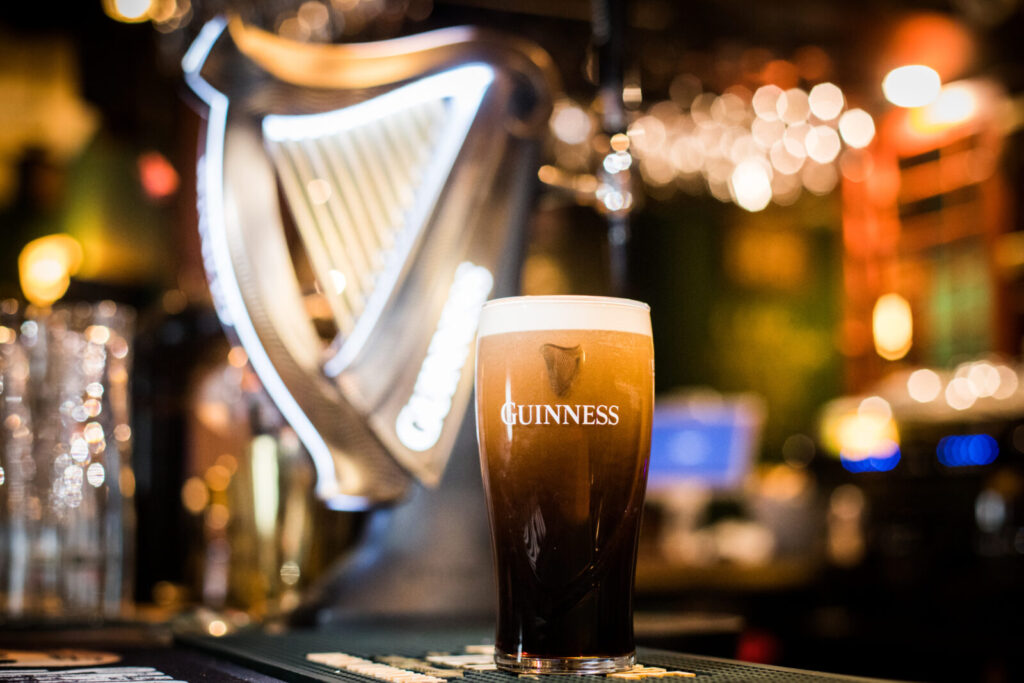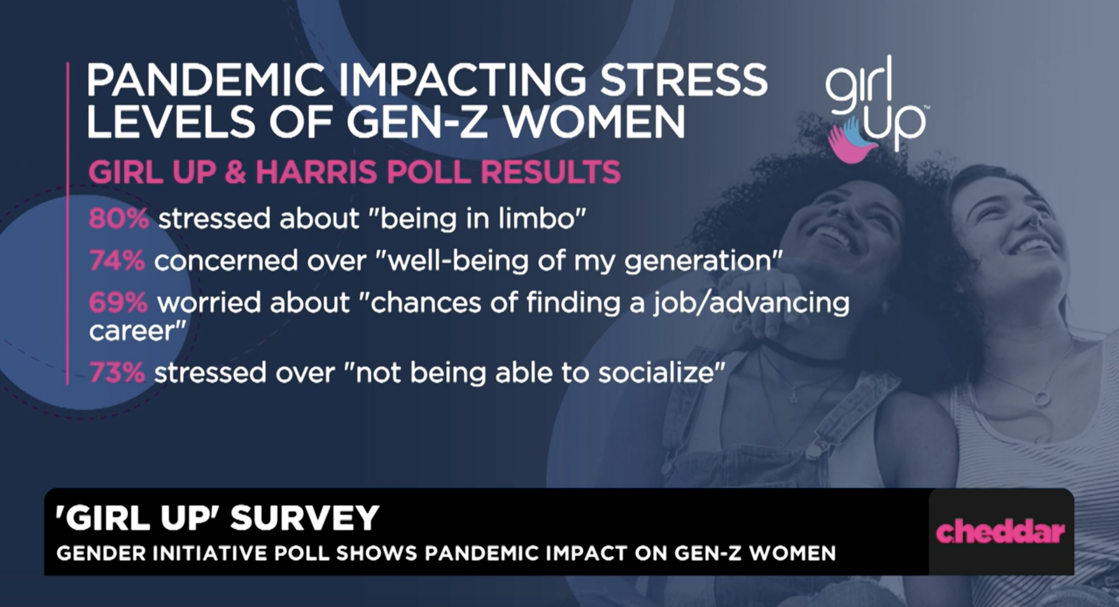Brief • 3 min Read

In The Harris Poll COVID-19 Tracker (Week 41) fielded December 4th – 6th, 2020, we look at vaccine misinformation on social media, Americans’ plans for Christmas travel, COVID’s impact on Gen Z women’s education, tax implications for the Americans working remotely during the pandemic, and check-in on attitudes towards a vaccine.
As a public service, our team has curated key insights to help leaders navigate COVID-19. Full survey results, tables, and weekly summaries can be accessed for free at The Harris Poll COVID-19 Portal. We will continue to actively field on a regular cadence to track the shifts in sentiment and behaviors as the news and guidelines evolve.
Axios Exclusive: Most Americans don’t trust social media on COVID-19 vaccine info
Our latest data, exclusively covered in Axios by Ina Fried found more than half of Americans say they have little or no trust in social media when it comes to information on the COVID-19 vaccine. Here’s a recap in case you missed it:

- Nearly three-fifths (57%) of Americans say they have either no trust or not much trust in the COVID-19 vaccine info they encounter on social media, compared to (43%) who had either some trust or a great deal of trust in such information.
- Why it matters: For a vaccine to be effective in taming the pandemic, people will have to receive accurate information — and then be able to identify it as such. For many, that will mean receiving it elsewhere than on social media.
- Nearly seven in 10 (69) agree “social media platforms such as Facebook and Twitter should aggressively monitor information about COVID-19 vaccines on their platform and remove any information they consider to be misleading.
- A similar number (68%) say “social media companies should establish clear guidelines as to what is considered credible information and sources on COVID-19 vaccines and only allow users to share from these sources.
- But that means nearly a third of Americans believe social media companies should let people share whatever information they want on COVID-19 vaccines, even if the platform considers it to be misleading.
- The Financial Times details how Facebook vows to remove false claims about COVID-19 vaccines from its platforms as well as its “plan to encourage users to take a vaccine, which could include publishing a banner at the top of users news feeds.”
Takeaway: The misinformation age has exacerbated—and been exacerbated by—the coronavirus pandemic. This will have detrimental effects on the efficacy of the covid-19 vaccine, which is already like a fire hose to a wildfire, as reported by the New York Times.
Home for Christmas
As Christmas approaches among a spike of COVID cases across the country, we took a closer look at how Americans are approaching this holiday season and the changes from 2019.
- Americans are 2x less likely to be attending in person gatherings; last year, (41%) attended an in-person gathering for Christmas vs only (21%) of those who say they will be doing that this year. Only (14%) say they will be hosting an in-person gathering this Christmas vs (23%) last year.
- Home for the holidays: Three quarters (75%) say they are not likely to travel for Christmas this year. More than 2 in 5 Americans (43%) say any of their Christmas plans have changed in the past few weeks. Of them, (55%) say how many people they would be seeing for Christmas has changed.
- Americans are 2x more likely to be celebrating Christmas virtually this year: Last year, only (11%) celebrated Christmas virtually compared to (26%) who say they will do so this year.
- Unwavering Festivity: (39%) have already decorated their Christmas tree (last year, (41%) decorated their Christmas tree in the first week of December) and 32% have put up decorations early (holding steady with the amount of americans (36%) who did so last year).
- Shopping early and local: (34%) have already started their Christmas shopping, and more than a third (36%) say they did or plan to purchase their real Christmas tree to help support local small businesses this year.
Takeaway: Americans (hopefully) will be cooped up at home this Christmas, meaning it’s more important than ever for brands to actively plan how to make the best of this Christmas. For example, brands which can provide last-minute or just-in-case solutions could have some big wins – for instance very last-minute shipping on DTC brands (especially if physical shops become inaccessible).
COVID’s Outsized Impact On Gen Z Women: UN Foundation Girl Up Harris Survey
Our latest joint research with Girl Up, a United Nations Foundation organization, found that Gen Z women feel like the pandemic is having an outsized impact on their education and personal lives. Melissa Kilby, Executive Director of Girl Up discussed the findings on Cheddar Live (watch here):
Here are the highlights:
- A majority (62%) of Gen Z Women say the pandemic has negatively impacted their education. While similar numbers of Gen Z Men (61%) say the same, Gen Z women are experiencing specific effects in higher rates:
- (59%) of women vs (48%) of men say “COVID has increased stress/anxiety distracting me from studying”
- (40%) of women vs (33%) of men have experienced “a gap in learning between school closures and start of virtual learning”
- (25%) of women vs (19%) men say the pandemic has “caused me to fall behind with virtual learning because I have limited internet access”
- Zooming in further, these impacts are even higher for Gen Z Women in college compared to Gen Z women in high school: (65%) are struggling to find places to study (vs 41% high school) and (59%) are struggling to stay motivated without school social community (vs 47% high school).
- Despite the prevailing narrative Gen Z are reckless, detached super-spreaders of CV-19, they actually feel a social responsibility to fight COVID-19, despite the outsized impact they’re experiencing: (82%) say, “I believe my generation has the power to help stop the spread, it’s up to us.”
Takeaway: Gen Z are the future of America, from the workforce to leadership, they will soon be at the helm. Empowering them to succeed now is critical for the future success of our country. And when it comes to fighting the pandemic, they’re not waiting around for tools and resources, they’re mobilizing their peers and leading grassroots change; (82%) are strictly following the mask mandate and actively encouraging others to do so too.
“For Remote Workers, Time Is Running Out to Fix State-Tax Messes” Wall Street Journal x Harris Poll
This year the coronavirus pandemic turned millions of workers into telecommuters, and many haven’t yet returned to the office. People who have worked from a state that isn’t their usual one may need to file returns and pay taxes to more than one state for 2020. How this impacts Americans’ tax bill featured this week in the Wall Street Journal’s coverage of our study with the American Institute of CPAs.
- These requirements will come as a shock to many: More than 7 in 10 (71%) of Americans don’t know that telecommuting from another state can affect a worker’s state-tax bill.
- The survey found that, among those Americans who are still fortunately employed, (42%) have worked remotely during the pandemic and (25%) are currently working remotely.
- The survey also revealed that more than half (55%) of those who have worked remotely during the pandemic were not aware that a failure to change their state tax withholding to reflect their remote work situation could result in tax consequences.
- Americans are looking out for their taxes:Our survey found that (67%) of those who have worked out-of-state notified their employer of the state they are working in, (51%) have tracked the number of days worked in each state, and (41%) have changed their state income tax withholding.
Takeaway: The shift to remote work is among the most covered topics of the COVID year, but the ramifications are still becoming clear as the new landscape comes into view. And some companies are already placing their bets: just last week, Salesforce acquired workplace software company Slack for $27.7 billion in what the New York Times calls the “biggest bet among a recent spate of acquisitions made by tech companies to capitalize on the shift to remote work.”
Vaccine Check-In
British media labeled Tuesday as “V-Day” or “Vaxit” as Margaret Keenan, a 90-year old grandmother, became the first person outside of clinical trials to receive the Pfizer-BioNTech COVID-19 vaccine, kicking off the country’s vaccination program. How are things looking across the pond?
- Overall, (40%) of Americans say they are not likely to take the COVID-19 vaccine, while (60%) of Americans say they likely will. Which Americans say they are not likely to take it? Women (44% vs 35% of men); Gen Z/Millennials (52% vs 38% of Boomers); Households with under $50k (54% vs 29% of Households over $100k); Republicans (46% vs 32% of Democrats); and Black Americans (49% vs 37% of White Americans) are some of the demographics least likely.
- Nearly half of Americans (47%) say they are frustrated the COVID-19 vaccine has not been approved yet in the U.S. Though we are likely getting close: the FDA’s first analysis found the Pfizer-BioNTech vaccine offered strong protection across demographics after just the first of two doses.
- A large majority of Americans (80%) agree with the CDC’s decision that healthcare workers and long-term facility residents should be the first to receive a COVID-19 vaccine once approved.
- Once enough Americans are vaccinated and we return to normal, we asked consumers what the first purchases or activities they’ll do: (53%) say visiting friends or family; (45%) go out to dinner; (33%) shop at the mall; (33%) go on a big vacation; (29%) go to a concert or theatre show; (25%) go to an amusement park; and (25%) go to a sporting event.
Takeaway: An effective COVID-19 vaccine in record time is a miracle of science, but it will not be a silver bullet to stop the loss of life: as the New York Times puts it: “At the current level of infection in the U.S. (about 200,000 confirmed new infections per day), a vaccine that is 95 percent effective – distributed at the expected pace – would still leave a terrible toll in the six months after it was introduced. Almost 10 million or so Americans would contract the virus, and more than 160,000 would die.”
Subscribe for more Insights
Subscribe to our newsletter for the latest trends in business, politics, culture, and more.
Download the Data
This survey was conducted online within the U.S. by The Harris Poll from December 4 to 6, 2020 among a nationally representative sample of 1,994 US. adults.
Download
Subscribe for more Insights
Subscribe to our newsletter for the latest trends in business, politics, culture, and more.
Download the Data
This survey was conducted online within the U.S. by The Harris Poll from December 4 to 6, 2020 among a nationally representative sample of 1,994 US. adults.
DownloadRelated Content









